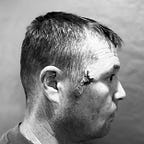I’m a sucker for sports movies.
From Rocky to Field of Dreams to Dodgeball, there’s something compelling about the triumphs and failures depicted in sports films. They serve as a brilliant metaphor for the human experience, capturing the essence of resilience and the pursuit of dreams. Whether it’s the underdog rising to the occasion or the bitter taste of defeat, these films remind us that every setback is just a setup for a comeback.
Plus, who doesn’t love a good training montage that makes us believe we can achieve anything—if only we can find the right soundtrack?
Anyway, in 2001 I started watching The Replacements on DVD in college after my roommate insisted it was one of the best sports movies he’d ever seen. It offers a funny take on the 1987 NFL players’ strike, featuring Gene Hackman as the coach and Keanu Reeves, who was transitioning from his role as the sophomoric Bill in Bill & Ted’s Excellent Adventure to the Christ-like Neo in The Matrix. However, I fell asleep before it was over.
Years later, The Replacements aired on cable TV. While the movie itself is a classic example of a clichéd sports film—complete with the underdog achieving victory—it doesn’t offer anything new to the genre. However, the best moment occurs when quarterback Shane Falco (Keanu Reeves) gathers his team for a huddle before the final play and delivers a quintessential motivational speech. Gasping for air, Falco says to his teammates:
“I know you’re tired. I know you’re hurting. And I wish I could say something classy and inspirational, but that just wouldn’t be our style: Pain heals. Chicks dig scars. Glory lasts forever.”
Cheesy? Maybe. But there’s something comforting in knowing that pain eventually ends, scars can be attractive, and the glory of victory is something we carry with us long after the game is over.
I am also a sucker for poetry. One of my favorite poems is Charles Bukowski’s Let it Enfold You. In this autobiographical poem, Bukowski–who was a raging drunk with a short fuse and a penchant for violence–writes:
“I even looked into
the mirror
once having thought
myself to be
ugly,
I now liked what
I saw, almost
handsome, yes,
a bit ripped and
ragged,
scars, lumps,
odd turns,
but all in all,
not too bad,
almost handsome,
better at least than
some of those movie
star faces
like the cheeks of
a baby’s
butt.”
If every scar is a story, Bukowski reassures us that there’s a transformative power in owning your narrative. Each scar, whether physical or emotional, is a reminder that vulnerability can lead to strength and that embracing our past is the first step toward personal growth.
As a (dis)abled writer now, I realize that my scars, and my disability, tell stories that resonate with others.
These scars are a testament to daily resilience and a reminder that perfection is overrated. They reflect the journey of navigating life’s challenges, illustrating that strength often comes from embracing our imperfections. By sharing my story, I hope to inspire others to see their own scars not as flaws, but as badges of honor that connect us in our shared humanity.
In a world that often relies heavily on beautifying filters, I’ve come to understand that self-love begins when we embrace our black-and-white scars.
So, the next time someone asks about my scars, I might just smile and say, “Yeah, chicks dig scars. And so do I.”
Be well,
Jay












